

 |
 |
|
 |
|
| About Us |
|
Read Past Issues | Resources | Composer Links |
San Francisco's Other Minds celebrates 10 years of probing the most brilliant fringes of contemporary music with Other Minds 10, March 4-5-6, 2004, at Yerba Buena Center for the Arts, San Francisco. Unique in format among music festivals worldwide, Other Minds 10 gathers participants from Canada, Armenia, Germany, Myanmar, China, Japan, Poland, Italy, South Korea, and the U.S., for three days of extraordinary musical events, including two world premieres, six U.S. premieres, and an array of unusual instruments. Other Minds executive director and festival artistic director Charles Amirkhanian has invited stellar composers and musicians from many cultures, traditions, and musical genres to appear at Other Minds 10. Participants include: Alex Blake, Amelia Cuni, Werner Durand, Francis Dhomont, Mark Grey, Keiko Harada, Joan Jeanrenaud, Hanna Kulenty, Tigran Mansurian, Jon Raskin, Stanley Shaff, and special guest performer, avant-garde accordionist Stefan Hussong. Also appearing are violist Kim Kashkashian; Anne La Berge on quarter-tone flute with Nicole Paiement and the Parallèle Ensemble; ROVA Saxophone Quartet with Jiebing Chen, Min Xiao-Fen, Shoko Hikage, Kyaw Kyaw Naing, Jim Santi Owen, and Sang Won Park, conducted by Gino Robair; Ted Cruz, Chris Hunter, Victor Jones, and Bidal Roy of the Alex Blake Quintet; Joel Davel, marimba; set designer Uli Sigg; and stilt-walking dancer Pamela Wunderlich. A co-presentation of Other Minds and Yerba Buena Center for the Arts, in association with the Djerassi Resident Artists Program, Other Minds 10 begins with three days of private retreat for guest composers at the Djerassi Resident Artists Program in Woodside. The festival then moves to San Francisco, March 4-6, for concerts, composer talks, a panel on Women in Music, films, a marketplace of hard-to-find books, recordings and original musical scores, and photographs from past Other Minds festivals by John Fago. A special event on the program will be a screening on March 6 of Khachaturian, a touching new documentary on the life and music of Armenian composer Aram Khachaturian (1903-1978) for his centennial, produced and directed by award-winning NY filmmaker Peter Rosen and narrated by Eric Bogosian. Included is previously unreleased Soviet footage of the 1948 congress denouncing the composer along with Prokofiev and Shostakovitch. Other Minds 10 presents concerts, films, talks and exhibits, from Thursday, March 4, through Saturday, March 6, 2004, at Yerba Buena Center for the Arts Theater (700 Howard St. @ 3rd) and Forum (701 Mission St. @ 3rd). Ticket prices for individual concerts are: $35 Premium / $27 Regular / $18 Budget. A Festival Pass for all events is: $80 Premium / $65 Regular / $45 Budget. A Student Discount deducts $3 Premium / $2 Regular / $1 Budget off concert tickets and passes. Advance tickets are available from the Yerba Buena Box Office at (415) 978-2787 (978-ARTS). Festival information is available at OtherMinds. See the full schedule here.
|
|
An Interview with Tobias Picker Handmaid Tale's Debuts in English Rautavaara Joins B&G Who's Afraid of Julia Wolfe Derek Bermel's Soul Garden The Pianist: The Extraordinary True Story of Wladyslaw Szpilman John Adams' Atomic Opera A Bridge Not Far Enough Turnage Signs With B&H Sophie's Wrong Choice Copland's Mexico On Being Arvo Rzewski Plays Rzewski Praising Lee Hyla David Lang's Passing Measures Three Tales at BAM Naxos at 15 On the Transmigration of Souls Dead Man Walking David Krakauer's The Year After Steve Reich/Alan Pierson
|

Trans Composer: Lee Hyla Conductor: Gil Rose Performer: Laura Frautschi, Tim Smith New World Records A rare opportunity to hear several of the major symphonic works of a true American original. Hyla happily mingles expressionistic, complex contemporary atonal idioms with elements of avant-garde jazz, and rock and garage band with results that cannot be anticipated. His honking, strongly articulated rhythms mask an inner beauty that almost always seems ready to burst into radiant sunshine. The three works on this disc—Concerto for Bass Clarinet and Orchestra (1988), Trans (1996), and the Violin Concerto (2001)—show Hyla at peak form, with stunning performances by Gil Rose and the Boston Modern Orchestra Project.
|
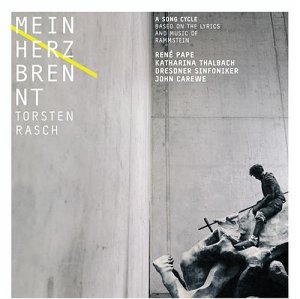
Mein Herz Brennt Composer: Torsten Rasch Performer(s): Rene Pape, Katharina Thalbach, Dresdner Sinfoniker Deutsche Grammophon The best part of this odd little exercise is the sensational baritone Rene Pape, who sings these re-set songs by the German punk rock group, Rammstein, as if they were written by Mahler, on a good day. |
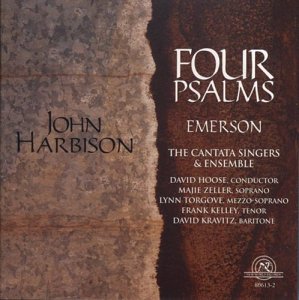
Four Psalms, Emerson Composer: John Harbison Performers: The Cantata Singers & Ensemble New World Records This is the first recording of one of John Harbison’s most important works, Four Psalms, which was commissioned to celebrate the fiftieth anniversary of the founding of the state of Israel. The composer describes Four Psalms as follows: "[It] opens with a prelude for mezzo-soprano and orchestra, a prayer composed by Amemar in 454 A.D., which states the major themes of the piece, both musical and philosophical … There follow four psalms, in Hebrew, alternating with the voices, in English, of people now living. The psalm settings employ fully developed forms—march, antiphon, passacaglia, and aria—suggested by the majesty and mystery of the Hebrew language. In contrast, the contemporary voices are set within brief inventions, their form echoing the momentary illuminations granted to those reflecting upon their own time." The other work, Emerson, is an a cappella setting of an extract from Emerson’s philosophical prose. Stunning performances and a must-have disk. |
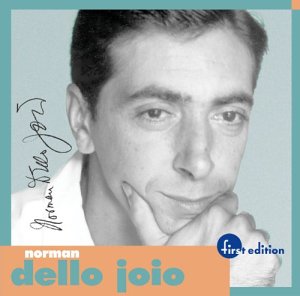
Homage to Haydn / Triumph of St Joan Composer: Norman Dello Joio Performer(s): Slatkin, Louisville Orch First Edition American composer Norman Dello Joio turned 91 in January and this re-issue of two of his significant works shows that his music is wearing well. Perhaps, a little too neo-classic or "accessible" for some modern sensibilities, Dello Joio's unique compositional fusion of American popular music, jazz, Italian opera and the liturgical music of the Catholic church has an elegance that transcends the label of easy listening. Two wonderful works by Dello Joio are featured on this First Edition release: the stirring, widely acclaimed Louisville Orchestra commission, Triumph of St. Joan Symphony, which debuted with Martha Graham as dance soloist, and his Homage to Haydn, an jubilant tribute that reflects Dello Joio’s studies with Paul Hindemith. |
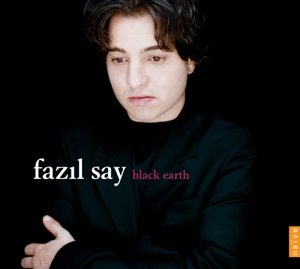
Black Earth Composer: Fazýl Say Conductor: Muhai Tang, Eliahu Inbal Performer: Fazil Say, Laurent Korcia Naive The Turkish pianist Fazýl Say has built a formidable reputation for himself through a string of first-rate recordings of Mozart, Bach, Gershwin and Stravinsky. This time around, Say demonstrates that he is also a composer of considerable talent. The title piece, Black Earth for solo piano, is based on a Turkish folksong, in which Say, evoking the saz, a Turkish traditional instrument, simultaneously plays the keys and the strings inside the piano, producing an otherworldly sound. Say's compositions are hardly classical--more like Keith Jarrett with a dynamite hook-- but these are daring and exciting performances. |
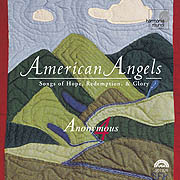
American Angels Performer(s): Anonymous 4 Harmonia Mundi Franc Anonymous 4 turns from the medieval repertoire to explore the roots of American sacred music. Developed in Toni Morrison’s Atelier program at Princeton in spring 2003, American Angels includes songs of redemption and glory from the time of the American Revolution to the present day: 18th-century psalm settings from rural New England, 19th-century shape-note and camp revival songs from the rural South, and some of the nation’s best-loved gospel songs. Drawing from collections including “The Southern Harmony,” and “The Sacred Harp,” - the album explores the beauty and power of early American sacred music and the relatively obscure form of a cappella choral singing known as Sacred Harp. |

Violin Concerto Composer: Khachaturian, Performer(s): Mihaela Martin, Kuchar, Nat'l So Ukraine Naxos It takes a lot of virtuosity to keep Khachaturian's demanding Violin Concerto afloat and the Romanian violinist, Mihaela Martin, does a masterful job. Her version is less daring, say, than that of, David Oistrakh, to whom the piece is dedicated, but she skillfully navigates the bristling outer movements and pours her soul into the elegaic central movement. Among recent versions this holds it own with the very best.
|
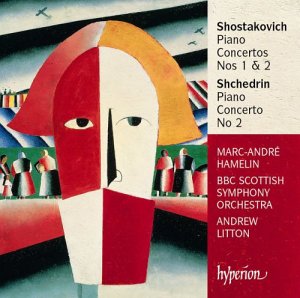
Shostakovich Piano Concerti Nos. 1 & 2 Shchedrin Piano Concerto No. 2 Marc-André Hamelin (piano), BBC Scottish Symphony Orchestra, Andrew Litton Hyperion Marc-Andre Hamelin makes child's play of these two very different piano masterpieces of Shostakovich. Fabulously accompanied by the BBC Scottish Symphony, led by Andrew Litton, Hamelin provides not simply his usual technical brillance but also a feeling for the material that sounds--to this listener--definitive. The Shchedrin concerto, though less well-known, is no less enjoyable. |

Ulisse Composer: Luigi Dallapiccola Conductor: Ernest Bour Radio France Dallapiccola's
final masterpiece, the opera Ulisse, which premiered in Berlin in 1968,
recounts the voyage both of Homer’s hero and of mankind's search
for eternal truths. Recorded in 1975, a few months after the composer's
death, this performance is the culmination of a lifetime of meditation
and musical discipline by one of the great humanists of the 20th century
arts.
|

Early and Unknown Piano Works Composer: Morton Feldman Performer(s): Debora Petrina OgreOgress Productions Previously
unrecorded pieces from the early 40s reveal Feldman during the period he
studied with Wallingford Riegger. No real surprises here but no klunkers
either. His composition style borrows 12-tone techniques and
atonality but deploys them within more traditional neo-classic structures.
|

Guitar Concertos & Solos Composer: Poul Ruders Performer: David Starobin, guitar Bridge The
long and intimate collaboration between Poul Ruders, the brilliant composer,
and David Starobin, the splendid guitarist, (who also happens to be David
Starobin, the successful record executive--co-founder of Bridge Records)--has
led to some of the most challenging and original compositions in the modern
guitar repertory. Consider this a kind of "greatest hits" for the
modern classical guitar.
|

Symphonies 1 & 7 Composer: Aulis Sallinen Performer: Staatsphilharmonie Rheinland-Pfalz, Ari Rasilainen cpo Another great Finnish composer, ho hum, but Aulis Sallinen (b. 1935) is, with Rautavaara, the latest proof that small countries can produce big composers. There are hints of Sibelius, of course, but Sallinen is a unique voice that speaks directly. His work is tonal and completely devoid of the modern medievalism that characters much north of the Arctic Circle music. |
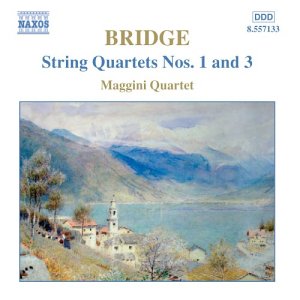
String Quartets 1 & 3 Composer: Frank Bridge Performers:. Maggini String Quartet Naxos Frank Bridge is a bit of a lost horse in the English stable of composers that includes such giants as Elgar, Vaughan Williams and, his student, Benjamin Britten. But he shouldn't be. No. 1, written in 1901, is a mature, fully realized work; No. 3, composed in 1927 is one of the pilars of 20th century chamber music. As always, the Maggini play magnificiently and the recording is first rate. |
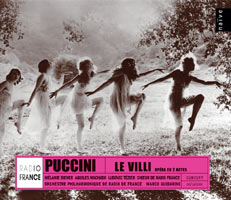
Le Villi Composer: Giacomo Puccini Conductor: Marco Guidarini Performer: Melanie Diener, Ludovic Tezier, et al. Radio France Chorus, French Radio Philharmonic Orchestra Naive Just
listening to young Puccini's first opera (as opposed to seeing it staged
and sung), you notice immediately that the big sweeping melodies, the ingenious
"hooks" are already there. Naive has also issued a Radio France recording
of Puccini’s second opera, Edgar,
written five years after Le Villi. In this more ambitious and
complicated work, Puccini develops his technique using a score that merges
stirring arias and ensembles.
|
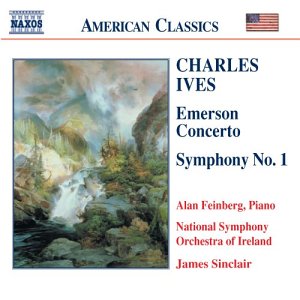
Emerson Concerto / Symphony 1 Composer: Charles Ives Performers: Alan Feinberg (piano), National Symphony Orchestra of Ireland, James Sinclair (conductor) Naxos Ives sketched the Emerson Concerto in 1907 but never fully finished it, although he used portions in other works. David G. Porter, a noted Ives scholar, was able to create a performing version which was premiered in 1998 by Alan Feinberg, the pianist on this premiere recording. The piece is extremely demanding, often abrasive, and demands exceptional virtuosity. Symphony No. 1 is fetching, but not as charateristic, of the great American maverick that followed. |
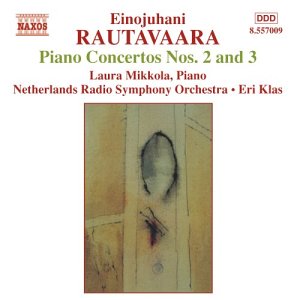
Piano Concertos 2 & 3 Composer: Einojuhani Rautavaara Performers: Laura Mikkola (piano), Netherlands Radio Symphony Orchestra, Eri Klas (conductor) Naxos The Finnish composer Rautavaara has enjoyed enormous success in recent years with his unique blend of northern lights impressionism and romanticism served up in an aura of modernity. His Cantus Articus is immensely popular, conjuring up associations of Messiean, although the latter is a much more important composer. The Third Piano Concerto from 1998 is forceful, drawings on the Russian school of pianism, although it not technically flashy until the finale. The Second, composed nine years earlier, is more traditional and Laura Mikkola, already on disc with a highly regarded account of the First Concerto, again provides an outstanding performance. |
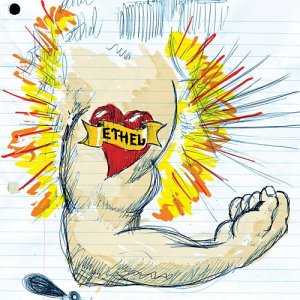
Ethel Composers: King, Kline, Reynolds, Ziporen Performers: Ethel Cantaloupe New
York's most daring string-quartet sensation, Ethel, makes its debut here
with a menu of the kind of hard-edged downtown music that has won the group
a big following in the NY new music scene. Todd Reynolds and
Mary Rowell, violins; Ralph Farris, viola; and Dorothy Lawson, cello—all
began their careers in New York as freelance musicians, playing difficult
music that relies heavily on non-classical sources but requires a virtuoso
classical ensemble to play. Its repertoire ranges from John King's energetic
blues transcriptions to the gnarly quartets of Julia Wolfe
and on Todd Reynolds' quirky
|
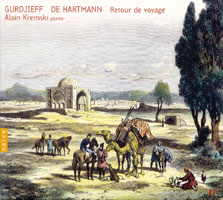
Return from a Journey Composers: Gurdjieff, De Hartmann, Performer: Kremski Naive Gurdjieff
was a Russian Aremenian spiritual master who, in addition to the main body
of his teaching created sacred dances, or Movements, as well as 200
or so musical compositions--all of which were were done in collaboration
with German composer Thomas de Hartmann at Gurdjieff's Institute
for the Harmonious Development of Man, near Paris, in the years 1925–27.
For many years, the pieces heard here were played only by De Hartmann or
another of Gurdjieff's disciples but in recent years they have attracted
the interest of a number of adventuresome pianists. Kremski plays
these exotic, vaguely oriental and oddly thematic pieces with great respect
and warmth.
|
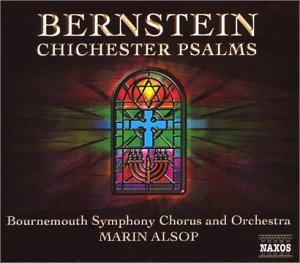 Chichester
Psalms
Chichester
Psalms
Composer: Leonard Bernstein Performers: Bournemouth Symphony Orchestra and Chorus, Marin Alsop (conductor) Naxos Commissioned in 1965 by the Dean of Chichester, Bernstein’s colorful Chichester Psalms is one of the composer’s most successful and accessible works on religious texts, contrasting spiritual austerity with impulsive rhythms in a contemplation of peace. The composer fashioned his Oscar nominated score to the 1954 movie On the Waterfront into a symphonic suite, skillfully capturing the oppression of the New York dockyards in the ’50s. The Three Dance Episodes were extracted from the popular On The Town, Bernstein's first successful foray into musical theatre. Bernstein protege Marin Alsop gets a robust performance from Bournemouth orchestra and chorus. |
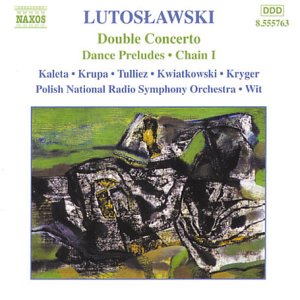
Double Concerto Composer: Witold Lutoslawski Performers: Polish National Radio Symphony, Antoni Wit Volume 8 in Naxos' indispensible survey of Lutoslawski's orchestra work brings us into lesser known territory but there are still treasures to be found. The Dance Preludes from 1955 is basically a five-movement clarinet concerto, with lots of interesting harmonies and rhythmic twists and turns. The Double Concerto for oboe and harp from 1990 rattles the ear a bit and has a demanding oboe part, beautifully played by Arkadiusz Krupa. The Children's Songs, gorgeously sung by the soprano, Urszula Kryger, are beguiling. |
 |
Search WWWSearch www.sequenza21.com |
